English CBSE Class 10 NCERT Footprints Without Feet Chapter 6 The Making of a Scientist Free Solution of Extra Questions and Answers – Extract Based Questions Short Answer Questions Long Answer Questions and Value Based Questions
THE MAKING OF A SCIENTIST
(Extra Questions)
Multiple Choice Questions
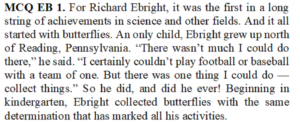

(i) Based on the extract, please classify following as fact and opinion.
1. The first achievement for Ebright came in the field of butterflies.
2. Ebright was interested in playing football.
3. Ebright had a strong determination for every activity that he started.
4. Shortage of other avenues at Reading was the main cause for Ebright to become a collector of things.
(a) F – 1,2 and O – 3,4
(b) F – 2,4 and O – 1,3
(c) F – 1,3 and O – 2,4
(d) F – 3,4 and O – 1,2
(ii) Please read following sentences and based on the extract select the correct option
Statement 1: During his life span, Ebright indulged in many activities.
Statement 2: Ebright had a strong determination
(a) Statement 1 alone can be inferred
(b) None of the statements can be inferred
(c) Both statements can be inferred
(d) Statement 2 can be inferred but statement 1 cannot be inferred
(iii) A word ‘string’ has been used in the extract. Which of the following word can be used in its place?
(a) yarn
(b) series
(c) thread
(d) expertise
(iv) Which of the following has not been explained in the extract?
(a) Ebright was an achiever
(b) Ebright started collecting things when he was in kindergarten.
(c) Ebright was in the habit of Reading.
(d) Ebright was aware about football and baseball.
(v) Which of the following could be a suitable title for the extract?
(a) Butterflies in Reading
(b) Successful collection of butterflies.
(c) Determination – the hidden strength of Pennsylvania
(d) Doers are successful
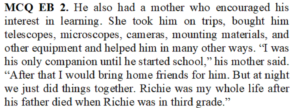

(i) Based on the extract, please classify following as fact and opinion.
1. Richie lost his father when he was three.
2. Richie did not like to mingle with his friends.
3. Richie’s mother tried to keep him busy.
4. Mother escorted Richie for outings.
(a) F – 1,2 and O – 3,4
(b) F – 2,4 and O – 1,3
(c) F – 1,3 and O – 2,4
(d) F – 3,4 and O – 1,2,
(ii) Which of the following word as used in the extract means ‘inspired’?
(a) helped
(b) encouraged
(c) companion
(d) bought
(iii) Which of the following instrument was not bought by Richie’s mother?
(a) An equipment to see things that are far off
(b) An equipment to see things that are too small
(c) An equipment to play baseball
(d) An equipment to click pictures
(iv) “I was his only companion until he started school,” In reference to this sentence of the extract, which of the following is not the correct use of words ‘only’ and ‘until’.
(a) Only I had waited for you until you arrived.
(b) Albert was the only sportsperson of the school until Priya joined our school.
(c) Students of only class ten were asked not to leave until permitted by the class teacher.
(d) David is the only person who does not reach office until it is ten in the morning.
(v) Which of the following can definitely be inferred from the extract?
(a) During early age, Richie was content to play alone.
(b) Richie’s mother was fully devoted to her son.
(c) It is difficult to tolerate death of a parent.
(d) Children should know about telescope and microscope


(i) Based on the extract, please classify following as fact and opinion.
1. Tagging butterflies helped Dr. Urquhart.
2. Some people might not have sent tags to Dr. Urquhart.
3. The weight of the tag was relatively less.
4. Urquhart was the most respected scientist of Canada.
(a) F – 1,2,4 and O – 3
(b) F – 2,3 and O – 1,4
(c) F – 1,3 and O – 2,4
(d) F – 2,4 and O – 1,3
(ii) What was being researched by Dr. Urquhart.?
(a) Development of butterflies
(b) Flight path of butterflies
(c) Seasonal movement of butterflies
(d) None of the above
(iii) To whom were people requested to send back the tags?
(a) Urquhart.
(b) University of Toronto
(c) Ebright
(d) None of above
(iv) What, according to the extract, was the reason that Ebright’s mother wrote to Dr Urquhart?
(a) She wanted to help Dr Urquhart
(b) She wanted wider participation of people in the research
(c) She wanted to motivate Ebright
(d) She wanted to know more about migration of butterflies
(v) Please read following sentences and based on the extract select the correct option
Statement 1: Dr Urquhart assumed that people would help in his research.
Statement 2: Ebright was the best help available to Dr Urquhart
(a) Statement 1 alone can be inferred
(b) None of the statements can be inferred
(c) Both statements can be inferred
(d) Statement 2 can be inferred but statement 1 cannot be inferred
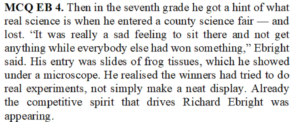

(i) Which of the following could be the most suitable title for the extract?
(a) Display is more important than content
(b) Learn from failures to become successful.
(c) Discard the feeling of not winning
(d) Losing and winning – two sides of same coin
(ii) Please read following sentences and based on the information provided in the extract, select the correct option.
Statement 1: Ebright learnt a good lesson at county science fair.
Statement 2: The science fair ignited competitive spirit in Ebright.
(a) Statement 2 is true but cannot be inferred from the extract.
(b) Statement 1 can be inferred from the extract.
(c) Both statements are true and can be inferred from each other
(d) Both statements are true and can be inferred from the extract
(iii) ‘His entry was slides of frog tissues’. In which of the following sentence the word ‘entry’ has not been used in the same sense as that used in this sentence?
(a) My entry to this literary festival was a poem.
(b) ‘Natu – Natu’ is an entry from India for Oscar awards of this year.
(c) Depika’s entry onto the stage was greeted with loud applause
(d) Prakash submitted his entry to the college musical competition.
(iv) Please arrange the following events in sequence of their occurrences – the event that occurred first should be written first.
1. Ebright reaches seventh grade
2. Competitive spirit started surfacing in Ebright
3. Ebright does not win in the county science fair
4. Ebright’s entry is display of slides of frog’s tissue
5. Ebright understood the need to conduct experiments
(a) 1, 2, 3, 4, 5
(b) 1, 5, 4, 3, 2
(c) 1, 3, 2, 4, 5
(d) 1, 4, 3, 5, 2
(v) Which of the following can be definitely concluded from the above extract?
(a) Every student of seventh grade should participate in science fair.
(b) Participating is more important than winning
(c) Doing something innovative brings one closer to winning
(d) Making slides of frog’s tissue always results in defeat.
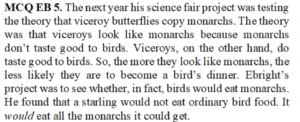

(i) Based on the extract, please classify following as fact and opinion.
1. Starling likes to eat monarchs.
2. Ebright was more likely to not to test a theory.
3. Most birds do not like to eat Viceroys.
4. Dinner is the best part of bird’s food.
(a) F – 1,2,4 and O – 3
(b) F – 1,3 and O – 2,4
(c) F – 3,4 and O – 1,2
(d) F – 2,4 and O – 1,3
(ii) Which of the following word / phrase can replace the word ‘dinner’ as used in the extract?
(a) food
(b) night – food
(c) best food
(d) candle light food
(iii) Which of the following statement best describes the assumption made by Ebright to conduct his science fair project?
(a) Some birds are called starlings.
(b) Most birds do not like to eat monarchs.
(c) Conducting experiment on butterflies ensures award at science fair.
(d) Taste of a viceroy is similar to that of a monarch.
(iv) ‘He found that a starling would not eat ordinary bird food.’ Which of the following best describes the message conveyed by this sentence?
(a) You are remembered for the rules you break.
(b) Almost every rule has an exception.
(c) Master the rules so that you can break these as an artist.
(d) Good people do not need any rule.
(v) Please read following sentences and based on the extract select the correct option
Statement 1: Ebright had conducted an experiment on butterflies.
Statement 2: The jury of the science fair appreciated Ebright’s project
(a) Statement 1 alone can be inferred
(b) None of the statements can be inferred
(c) Both statements can be inferred
(d) Statement 2 can be inferred but statement 1 cannot be inferred
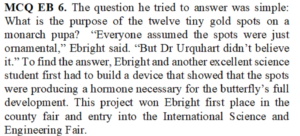

(i) Based on the extract, please classify following as fact and opinion.
1. Ebright did the project about gold spots with some other students.
2. Ebright won in every science fair that he participated.
3. Urquhart could have himself conducted research on gold spot.
4. Ebright’s project was appreciated by the jury of the county fair.
(a) F – 1,3,4 and O – 2
(b) F – 3,4 and O – 1, 2
(c) F – 1,4 and O – 2,3
(d) F – 1,3 and O – 2,4
(ii) Which of the following word used in the extract would complete the following analogy
decorative: required :: ornamental: _______
(a) county
(b) development
(c) necessary
(d) believe
(iii) In order to find the purpose of the twelve tiny gold spots on a monarch pupa, which of the following needed to be done first?
(a) File an entry into county science fair.
(b) Make an instrument to confirm production of hormone.
(c) Study the development cycle of monarch pupa.
(d) Collaboration among several scientists.
(iv) “Everyone assumed the spots were just ornamental,” Ebright said. In which of the following sentence the word ‘just’ has not been used in the same manners as that used in this sentence.
(a) It is just an excuse.
(b) They jury gave a just decision.
(c) He came here just to meet me.
(d) Reading this book is just waste of time.
(v) Please arrange following incidents in the order of their occurrences. Activity that occurred first needs to be mentioned first?
1. Ebright wins award at county science fair.
2. Device to detect hormone is made.
3. Urquhart had another opinion about gold spots.
4. It was a general perception that gold spots were merely ornamental.
(a) 1, 2, 3, 4
(b) 4, 3, 2, 1
(c) 3, 2, 4, 1
(d) 4, 1, 3, 2
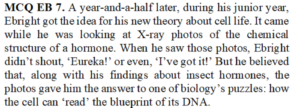

(i) Based on the extract, please classify following as fact and opinion.
1. It is possible for some people to find new theory while studying.
2. It was difficult for Ebright to control his happiness after seeing X – ray photos.
3. Ebright clubbed his two studies to solve a riddle.
4. The cell knows all about the blueprint.
(a) F – 1,2 and O – 3,4
(b) F – 2,4 and O – 1,3
(c) F – 1,3 and O – 2,4
(d) F – 1,4 and O – 2,3
(ii) Which of the following word / phrase as used in the extract means ‘afterwards’?
(a) puzzles
(b) blueprint
(c) later
(d) idea
(iii) How many puzzles biology has?
(a) One
(b) Two
(c) Three
(d) Many
(iv) Which of the following event occurred first
(a) Ebright finds about chemical structure of hormone
(b) Ebright gets idea for theory about cell life
(c) Ebright enters his junior year
(d) Ebright combines two studies to solve one puzzle of biology
(v) Which of the following can definitely be inferred from the extract?
(a) DNA is a part of cell
(b) It is easy to draw inference from X-ray photo
(c) Ebright had a soft voice.
(d) Ebright delayed his new theory by a year and a half.
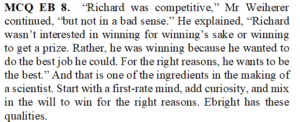

(i) Based on the extract, please classify following as fact and opinion.
1. Richard was not interested in winning for winning’s sake.
2. Ebright has required qualities for being a scientist.
3. Curiosity is necessary to become a scientist.
4. Weiherer was closely observing Richard.
(a) F – 1,2 and O – 3,4
(b) F – 2,4 and O – 1,3
(c) F – 2,3 and O – 1,4
(d) F – 1,4 and O – 2,3
(ii) Which of the following word / phrase as used in the extract means ‘excellent’?
(a) competitive
(b) winning
(c) first-rate
(d) right
(iii) Which of the following has not been mentioned as a reason for Richard winning prizes?
(a) He was competitive but not in a bad sense.
(b) He wanted to win for the sake of winning
(c) He wanted to do his best
(d) None of the above
(iv) ‘And that is one of the ingredients in the making of a scientist.’ Which of the following sentence is not the correct use of phrase ‘one of the’?
(a) Suresh is one of the best students of our school.
(b) Car is one the means of transport.
(c) Our house is one of the cleanest house of our society.
(d) Medicine is one of the professions which is sought after by many.
(v) Which of the following can definitely be inferred from the extract?
(a) Winning is an essential qualification for life.
(b) Richard Ebright had the essential ingredients to become a scientist.
(c) Ebright wanted to win either by hook or by the crook.
(d) Weiherer was one of the teachers of Richard Ebright.
Extract Based Questions


1. Who is referred as ‘he’ in the above extract?
2. Which word in the above extract means ‘lot of’?
3. Why did ‘he’ write to Dr Urquahart for ideas?
4. Where did Dr Urquhart work?


1. Who is referred as ‘I’ in the above extract?
2. Write the word from extract which is synonym of ‘at last’ ?
3. Which butterflies ‘I’ used to tag?
4. Why did ‘I’ begin to lose interest in tagging?


1. Who is speaker of above extract?
2. What was the profession of the speaker?
3. What word in the extract is antonym of ‘worst’?
4.In the context of above extract write antonym of ‘right’?


1. Where was Ebright’s home town?
2. Who helped him in his work?
3. In reference to above extract, write antonym of ‘around’?
4.How many species of butter fly Ebright collected?


1. Write antonym of ‘beginning’?
2. Other than butterflies what did Ebright collect?
3. How many types of butterflies did Ebright collect?
4. Who gave him ideas for conducting experiments on butterflies?


1. Who is the speaker of above extract?
2. In which class was the speaker studying when he spoke above extract?
3. What was the entry of speaker in that competition?
4. What was the learning from that competition?


1. Who has proposed the new theory?
2. Which word in the above extract is antonym of ‘spreading’?
3. What is explained in the new theory?
4. In which institute Ebright was studying when he made this discovery?
Short Answer Questions (30-40 words)


Answer: Ebright tried to find the cause of a viral disease that killed monarch caterpillars every few years. He thought disease might be caused by beetles. He tried to raise caterpillars in the presence of beetles. He did not get any result but he showed his experiment.
He won a prize.


Answer: According to Weinherer, Ebright always used to put in extra efforts for every activity. Ebright was competitive. He was not interested in winning for the sake of winning or winning to get a prize. He was winning because he wanted to do the best. For right reasons he wanted to be the best.


Answer: In an experiment Ebright had defined the purpose of twelve tiny golden spots on the wings of monarch pupa. He showed that these spots secrete a hormone necessary for development of pupa into an adult butterfly.
He won first prize for this project.


Answer: His mother took Ebright to several places, bought him telescope, microscope and other equipment. She ensured good company to him. She always kept him busy. She bought a book ‘The Travels of Monarch X’ for Ebright, which proved to be a turning point in his life.


Answer: In addition to collecting butterflies, he used to collect rocks, fossils and coins. He became an eager astronomer. He used to gaze at start all night.


Answer: Ebright realised that by chasing butterflies, one would not catch many butterflies. So he would catch a female monarch, take her eggs and raise them in his basement through their life cycle. Now he had many butterflies to tag.


Answer: Viceroys try to copy monarchs because birds do not like to eat monarchs. In order to save their own life, viceroy try to copy monarch.


Answer: Ebright showed that the golden spots produced a hormone necessary for the full development of butterfly. He grew a cell from a monarch’s wing in culture and showed that the cells would divide and develop only if they were fed the hormones from the golden spots.


Answer: When Ebright was looking at the X-ray photo of chemical structure of hormone, he got new idea about cell life. Combined with the finding of insect hormone, he now found out how cell can read blueprint of DNA.


Answer: Dr Urquhart was a scientist in Canada. He was doing experiments on butterflies.
Ebright had started tagging butterflies after reading a book. In his first science fair, he understood that he had to do some experiments to win a prize. He wrote to Dr. Urquhart to suggest some ideas for doing experiments.


Answer: Ebright had tagged a large number butterflies to study their migration. But information about only two of them was received. These were not more than seventy five miles from his home.
So he lost the interest.
Long Answer questions (120-150 words)


Answer: Success never comes straight at the first instance. Through dedication and constantly learning, failure can be turned into success.
Ebright started his journey by collecting butterflies. Then he moved on to tagging these. When he did not find enough butterflies, he started raising these in his basements.
In his first attempt at the science fair he did not win any prize. He understood that it was necessary to conduct experiments and show it to the world.
He requested help of Dr. Urquhart to obtain ideas about experiments. During those experiments he found that viceroys tried to copy monarch to avoid being prey to birds. This time he won a prize.
He later conducted series of experiments about twelve gold spots on wings of monarch. Eventually this led to a remarkable discovery how a cell communicates with DNA.
Thus we infer that Ebright faced failure many times in his life. But every time he turned it into a success through dedication.


Answer: During his early childhood Ebright had started collecting butterflies. He also collected rocks, fossils and coins. He was an eager astronomer. Sometimes he spent the full night gazing at stars.
During his high school he started participating in debating and Model United Nations clubs. He became a champion debater and an excellent public speaker. His teacher of social studies Mr Weiherer was the advisor to both the clubs.
Weiherer had written that Richard always gave extra efforts. He was not interested in the winning for the sake of winning. He was winning because he wanted to do everything in the best possible way.
Ebright was an expert photographer particularly of nature and scientific exhibits. He was a good canoeist. Actually Ebright was a perfect outdoor person.
Thus, we can infer that Ebright had several interest besides his scientific research.
****


0 Comments